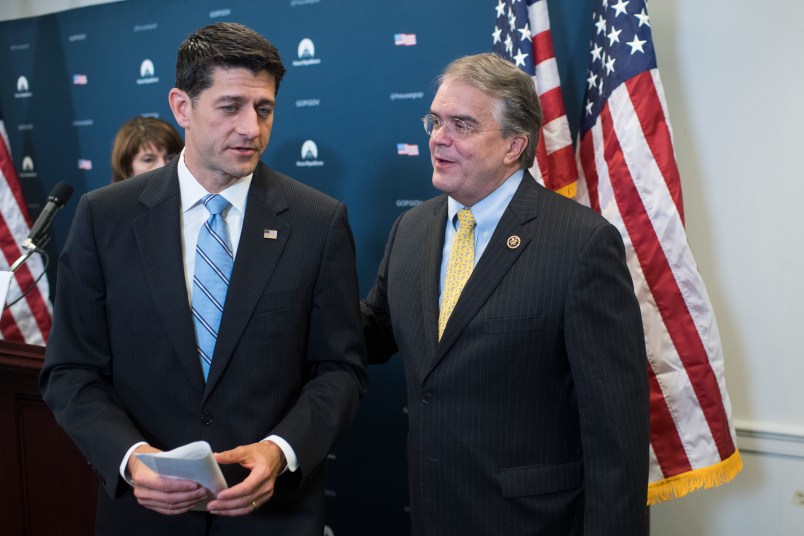The coalition of GOP immigration moderates demanding a fix to help undocumented immigrants brought here as children remain in the country legally is just three votes short of forcing the issue.
As the effort faces its biggest test on Tuesday, the only thing more surprising than the open revolt from dozens of House Republicans against their own leadership might be how many Republicans facing tough reelection fights haven’t joined them.
More than half of the House Republicans the nonpartisan Cook Political Report says are the most vulnerable incumbents in Congress haven’t joined the bipartisan effort to help force a vote on some version of the DREAM Act by signing a discharge petition that would force a vote on the House floor. That’s nine of the 17 members in Cook’s tossup category.
Some are bigger surprises than others.
The one member in the tossup category who could be seriously damaged by his allegiance to leadership is Rep. John Culberson (R-TX). The longtime congressman is facing his first tough election fight in years, and sits in a majority-minority district that is nearly one-third Hispanic and 10 percent Asian.
Many of the other members who haven’t signed on make more sense. Some are from whiter, more rural and populist districts where helping DACA recipients isn’t as popular, like Reps. Rod Blum (R-IA), Mike Bost (R-IL), and Claudia Tenney (R-NY). Others are from more upscale, relatively white suburbs where they might be on the opposite side of the majority of their district but it’s not a top issue for many voters, like Reps. Peter Roskam (R-IL), Keith Rothfus (R-PA), Jason Lewis (R-MN) and Barbara Comstock (R-VA).
Rep. Dana Rohrabacher (R-CA) has long been an immigration hardliner — and while Rohrabacher’s suburban Orange County district is diversifying it remains one of the whitest in Southern California (and one where the white voters are the most hardline anti-immigrant).
And some, like Rohrabacher, are just that doctrinaire conservative in their views or that serious about their allegiance to the party. Lewis, Tenney and Bost are all outspoken hardliners whose views are the bigger reason they’re in for tough races than the makeup of their districts, and many of the others on the list haven’t exactly made a habit of bucking House GOP leaders in the past.
That’s different than some of the Republicans who support the discharge petition. Two of the ringleaders in the effort, Reps. Carlos Curbelo (R-FL) and Jeff Denham (R-CA), who hail from heavily Hispanic districts, though others, like Reps. Leonard Lance (R-NJ) and Erik Paulsen (R-MN), come from the same kind of more upscale suburban districts as some of the holdouts.
The Republicans who are in slightly better political shape heading into this fall’s elections are significantly less likely to support the discharge petition. Just two (!) of the 21 Republicans Cook’s Dave Wasserman puts in the “lean Republican” category — that is, those who need to watch their backs but have the edge right now heading into the general election — have signed the petition. Those two are Rep. Will Hurd (R-TX), the third GOP leader of the discharge petition push, and Mia Love (R-UT), who represents a heavily Mormon district where immigration reform has much more backing from Republicans than most places (it’s supported by the Mormon church). Love also is the daughter of Haitian immigrants.
There are a few more Republicans in this category who could be hurt by their refusal to join the discharge petition: Rep. Mimi Walters (R-CA), whose district is about one fifth Hispanic and one fifth Asian American, and Rep. Pete Sessions (R-TX), a member of House GOP leadership whose district is more than one quarter Hispanic.
Here’s the full list of Republicans in tossup races who haven’t joined the discharge petition:
Rohrabacher
Blum
Roskam
Bost
Lewis
Tenney
Rothfus
Culberson
Comstock






